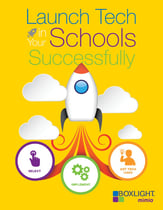
We are now at the time of the year when teachers are retiring or relocating to other schools. Administrators are looking to hire new teachers who will help take their schools to the next level in all aspects of education—especially in the area of technology.
What are some ways that principals can bring in educators who will be leaders in the area of technology? There are the basic ways to find out more about candidates, such as reference checks, resumes, applications, and cover letters. However, the traditional methods of exploring great candidates aren’t always enough to help find the right person. What are some other methods of discovering a candidate’s technical expertise and potential? Here are some ideas:
Before the Interview
Get examples: I love to review examples in an interview. I will sometimes ask for them to be emailed to me before the interview so we can discuss them together—this is much easier to do ahead of time. Teachers will often have paper copies or a portfolio to share, but something electronic is preferable if you are diving into the teacher’s technology expertise.
Look for training: Professional development is key for any teacher to keep improving. Hopefully the teacher has listed on their resume not only the trainings they have participated in, but also the dates when they did them. Look for recent trainings on specific programs, especially anything that aligns with what your school is already doing. Also, look for the number of opportunities a teacher has taken per year—this will give you an idea of how active the teacher is in pursuing new ideas. Is it one per year or five per year that the teacher is taking on?
During the Interview
Ask for specifics: When it comes to getting examples, it is always good to ask for specifics. Most teachers will be able to say, “I know Google Classroom,” but follow that up in the interview with a question about how they specifically use the program. I always like to dive into the details of a project to find out more about the design and planning process on the teacher’s end. How did they come up with the idea? How did they lay the groundwork and prepare for it to be successful? What did they like about how it went?
Ask for their “laundry list” and follow up: Most interviews include the laundry list of technology used when the topic comes up. It usually includes all the hardware that the teacher has used, such as an interactive whiteboard, iPads, laptops, etc. This is important to know on a basic level so the principal can see where the teacher is starting from compared to what the rest of the school is doing. It is also key to follow the list though—teachers will default to the “what” of equipment and programs, but the real question is the “how” of usage in the classroom. Follow up their laundry list with a question about how some of those pieces of equipment are used and how the teacher feels about them. Good things to listen for are, “We use them all the time,” or “I wish we had more access.”
Training matters, but implementation is key: You can check for trainings on the resume, but the interview is the time to find out more about implementation. I usually ask something like, “I see you have been trained in using document cameras in the classroom—tell me about that.” By leaving it more open-ended, the interviewer can get a feel for how excited the person is about the technology and how they have used it in the classroom. Listen for frequency of use, ease of implementation, and how passionate they are about it. This will give you insight to both leadership in this area and continued improvement and learning.
Give them a sense of something your teachers do with tech and see how they react: Breakout Edu has been hot this year in our classrooms. Once one teacher got the kit, everyone wanted a piece of it. I often try to work examples like this into the interview process. Once you give an example like this, you can tell how excited (or not) the candidate is about progressive ideas.
After the Interview
Ask for references: This may come earlier in the process depending on the district’s protocol, but if not, follow up the interview with questions to the references about technology. If there are any areas of concern, ask for specifics about the examples listed during the interview. “The teacher said they were trained in using LabDiscs and use them every day in the classroom, tell me about how that came to be.” Questions like this will tell you if the use of the technology was a mandate the teacher was forced into, or something the teacher sought out and led on their own.
Getting the right people and process in place for technology is key. In addition to these hiring tips, we have also developed a guide on how to launch and implement technology successfully in your schools. Download your free copy of this useful resource today.>>




